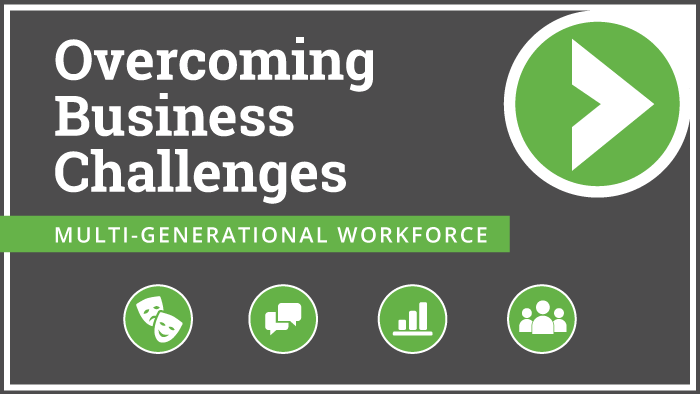
Having multiple generations in the workplace is not a new phenomenon, but the gaps between generational preferences and work styles are seemingly more disparate than ever.
Managing a team made up of three or four different generations can be difficult for managers to navigate, and trying to constantly appease everyone is maddening.
So what’s the solution to successfully bridging these generational differences?
Take the Bridge That’s Already There
Would it surprise you to know that each generation’s top values are more alike than they are different? When you look deeper than preferences in communication and adeptness with technology, it’s clear that there are stronger commonalities than there are differences.
The problem is that we’ve not done a good job revealing these commonalities because we often can’t seem to get past the surface tension. This is why stereotypes and negative attitudes run rampant, rather than understanding and collaboration across generations.
Research by Professor Kelly Pledger Weeks and her team is enlightening on this subject. They interviewed employees from all generations, and it was clear that meaningful work was valued highly among all of them.
Then Weeks conducted a survey of 298 participants, and when asked to select options closest to how they’d define meaningful work, “all generations chose items that revolved around intrinsic motivation first and foremost.”
What is interesting about that is what the research showed about negative stereotypes. Although all generations were focused on intrinsic motivation, they all perceived that the other generations were focused on money and rewards, and did not care about meaning in their work.
Wow. Talk about major miscommunication. Let’s look at how your organization can turn that around.
Eradicate the Stereotypes
If your managers are struggling with team issues stemming from different generational preferences, they can effectively help their teams get past differences by facilitating meaningful conversations and promoting emotional understanding.
“[Managers] can have more open conversations and workshops aimed at recognizing the commonalities across generations, where employees discuss what constitutes meaning in their lives and work. In this way, managers can allow existing definitions of meaning to emerge instead of dictating what should be meaningful.”
This helps teams better understand what motivates each of their colleagues and show empathy towards them rather than making assumptions that block collaboration.
The key aspect of these kinds of conversations lies in valuing the uniqueness of each team member.
Author Liane Davey says, “Take some time to consider each of your direct reports as a whole person — a function of their generation, their age and stage, and their personality. Don’t make the mistake of pigeonholing someone because of the year they were born.”
This is what makes emotional intelligence and coaching important skills in today’s workforce – because teams are made up of individuals, not boxes and labels.
Stereotypes can’t be dissolved without empathy. Although empathy is naturally present at different degrees in different people, you can help your managers and employees develop their emotional intelligence, including how empathetic and understanding they are towards others. Learn some key strategies in this free guide.
Invest in Individuals
When your managers are not only strong in managing processes and team workflows, but also in managing relationships and emotions, they can truly bring out the best in their teams. Managers who coach each employee on improving performance see greater engagement, loyalty, and results.
That investment in individual development really pays off for organizations. We’re all looking for the intrinsic motivation that comes from knowing we’re accomplishing something meaningful – now and in the future. Regardless of generation, employees who know their organization is invested in continually improving the world around them are more dedicated to creating positive results through their work.
“As a leader, you have to encourage each generation, each person, to operate at their own best level… If we share a common intent to do our individual best, we can trust each other even if we are at different levels — or in different generations.”
– Deidre Paknad, CEO and co-founder of Workboard
By understanding not only the differences, but the values that tie each generation together, you can create solutions customized to your company’s workforce.

